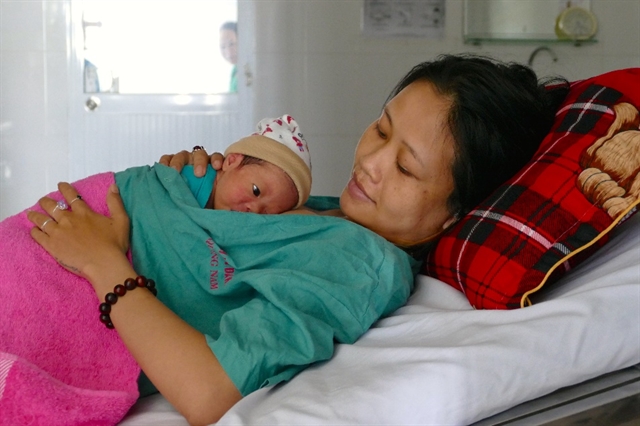 Society
Society

The Quảng Nam Provincial General Hospital today launched a human milk bank service in connection with the Đà Nẵng Human Milk Bank, helping to ensure breast milk for all babies, especially at-risk infants, in the province.

|
| A mother and newborn in skin-to-skin contact and breastfeeding at Quảng Nam Provincial General Hospital. — Photo from Alive & Thrive |
QUẢNG NAM — The Quảng Nam Provincial General Hospital today launched a human milk bank service in connection with the Đà Nẵng Human Milk Bank, helping to ensure breast milk for all babies, especially at-risk infants, in the province.
Not all newborns are able to access their mothers’ milk, including those who are born pre-term, low-birth weight, with other severe illnesses or whose mothers are sick. In those cases, the World Health Organisation (WHO) recommends pasteurised donor milk from a human milk bank as the first alternative to save infant lives and support optimal health and development.
“A human milk bank is an essential component of breastfeeding-friendly health systems,” said Roger Mathisen, Regional Director of Alive & Thrive Southeast Asia. “However, setting up a comprehensive bank requires large-scale human and financial investments. Therefore, the human milk bank service network is an initiative to expand the scope of the core human milk bank to neighboring provinces.”
A human milk bank process consists of three steps: 1) screening and collecting raw breast milk from donating mothers; 2) testing, processing and pasteurising; and 3) managing its usage. The Quảng Nam Human Milk Bank Service will firstly implement step 3 - distributing pasteurised breast milk from Đà Nẵng Human Milk Bank from July 30, and plan to facilitate step 1 after four months.
“In collaboration with Quảng Nam Provincial General Hospital, we operate a cold chain to guarantee the quality of pasteurised breast milk during transportation,” said Trần Thị Hoàng, Deputy Director of Đà Nẵng Hospital for Women and Children and Head of Đà Nẵng Human Milk Bank. “The milk distributed by the human milk bank service is traceable through our joint digital monitoring system.”
“The human milk bank service is set up on the foundation of a Center of Excellence for Breastfeeding where every pregnant woman is counselled on exclusively breastfeeding during hospital stay and after discharge,” said Nguyễn Thị Kiều Trinh, Head of Obstetrics, at Quảng Nam Provincial General Hospital. “However, each year in our hospital, there are still about 300 pre-term, low-birth weight and sick infants in need of donor human milk in their early days after birth. Our partnership with Đà Nẵng Human Milk Bank is expected to bring the benefits of pasteurised breast milk to these children.”
Director of the provincial Department of Health Mai Văn Mười said that in the future, when 21 public and private hospitals in Quảng Nam become Centers of Excellence for Breastfeeding, they will be qualified to connect with Quảng Nam Human Milk Bank.
“Hopefully, all babies, including over 1,000 at-risk infants every year in the province, will receive the benefit of breast milk from the beginning of their life,” said Mười.
The Ministry of Health, in collaboration with Alive & Thrive, is drafting the national guidelines on the establishment and operation of human milk banks and human milk bank services in Việt Nam.— VNS




